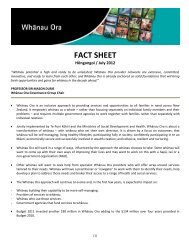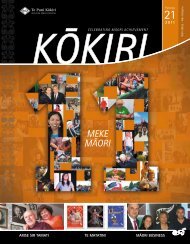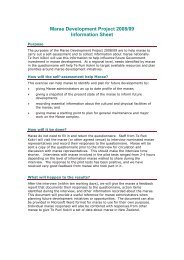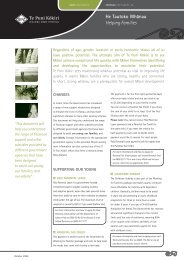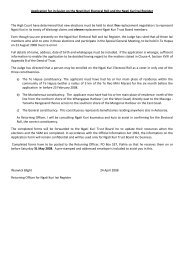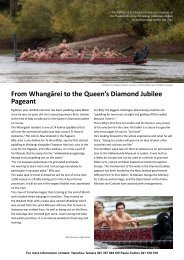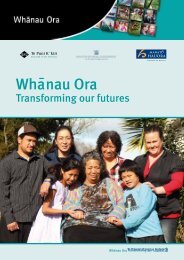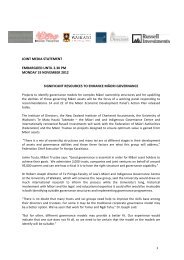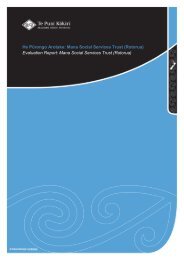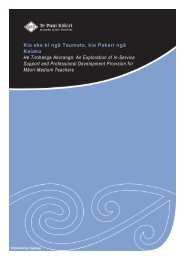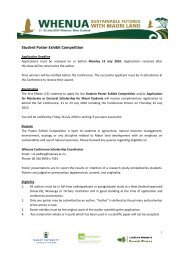Whanau Ora : Report of the Taskforce on Whanau-Centred Initiatives
Whanau Ora : Report of the Taskforce on Whanau-Centred Initiatives
Whanau Ora : Report of the Taskforce on Whanau-Centred Initiatives
Create successful ePaper yourself
Turn your PDF publications into a flip-book with our unique Google optimized e-Paper software.
We need to be passi<strong>on</strong>ate,<br />
visi<strong>on</strong>ary, willing, clever,<br />
wise and inclusive.<br />
Whānau Practiti<strong>on</strong>ers<br />
6.3.7 While many practiti<strong>on</strong>ers intuitively adopt a whānau-centred approach<br />
to <str<strong>on</strong>g>the</str<strong>on</strong>g>ir work, opportunities to develop skills in whānau interventi<strong>on</strong>s are<br />
n<strong>on</strong>e<str<strong>on</strong>g>the</str<strong>on</strong>g>less limited. A whānau approach is not usually built into c<strong>on</strong>tracts<br />
and is <str<strong>on</strong>g>of</str<strong>on</strong>g>ten added <strong>on</strong> as a logical but opti<strong>on</strong>al step, without explicit<br />
recogniti<strong>on</strong>. Whānau <str<strong>on</strong>g>Ora</str<strong>on</strong>g>, however, focuses directly <strong>on</strong> whānau and carries<br />
an expectati<strong>on</strong> that practiti<strong>on</strong>ers will be well equipped to intervene at<br />
that collective level. Moreover, <str<strong>on</strong>g>the</str<strong>on</strong>g> c<strong>on</strong>versi<strong>on</strong> <str<strong>on</strong>g>of</str<strong>on</strong>g> a whānau crisis into an<br />
opportunity for enhanced whānau capability will require an approach that<br />
is generally outside models <str<strong>on</strong>g>of</str<strong>on</strong>g> crisis interventi<strong>on</strong>.<br />
6.3.8 Whānau practiti<strong>on</strong>ers come from a range <str<strong>on</strong>g>of</str<strong>on</strong>g> backgrounds, including<br />
community work, social work, nursing, health promoti<strong>on</strong>, public health<br />
and youth justice services. The introducti<strong>on</strong> <str<strong>on</strong>g>of</str<strong>on</strong>g> Māori models <str<strong>on</strong>g>of</str<strong>on</strong>g> practice<br />
into health and social services has accelerated <str<strong>on</strong>g>the</str<strong>on</strong>g> emergence <str<strong>on</strong>g>of</str<strong>on</strong>g> a<br />
whānau-oriented workforce which is able to combine intuitive skills with<br />
learned practices. Over time a distinctive body <str<strong>on</strong>g>of</str<strong>on</strong>g> practice based around<br />
whānau-centred interventi<strong>on</strong>s will emerge as a specialist area <str<strong>on</strong>g>of</str<strong>on</strong>g> work.<br />
6.3.9 The <str<strong>on</strong>g>Taskforce</str<strong>on</strong>g> c<strong>on</strong>siders that <str<strong>on</strong>g>the</str<strong>on</strong>g> implementati<strong>on</strong> <str<strong>on</strong>g>of</str<strong>on</strong>g> Whānau <str<strong>on</strong>g>Ora</str<strong>on</strong>g> will require<br />
expert practiti<strong>on</strong>ers. Experience in whānau settings, Māori communities and<br />
multiple provider organisati<strong>on</strong>s will be needed, complemented by dedicated<br />
training in whānau-centred interventi<strong>on</strong>s.<br />
Service Delivery Goals: Recommendati<strong>on</strong>s<br />
6.3.10 The <str<strong>on</strong>g>Taskforce</str<strong>on</strong>g> recommends that <str<strong>on</strong>g>the</str<strong>on</strong>g> main goal for Whānau <str<strong>on</strong>g>Ora</str<strong>on</strong>g> providers<br />
and practiti<strong>on</strong>ers should be to make substantial c<strong>on</strong>tributi<strong>on</strong>s to whānau<br />
outcomes by:<br />
• delivering integrated and coherent services<br />
• increasing gains for individuals and <str<strong>on</strong>g>the</str<strong>on</strong>g> whānau as a whole<br />
• dem<strong>on</strong>strating high levels <str<strong>on</strong>g>of</str<strong>on</strong>g> expertise in whānau interventi<strong>on</strong>s.<br />
6.4 Goals for Efficient Governance and Management<br />
Nati<strong>on</strong>al Coordinati<strong>on</strong> and Leadership<br />
6.4.1 Nati<strong>on</strong>al coordinati<strong>on</strong> and leadership <str<strong>on</strong>g>of</str<strong>on</strong>g> <str<strong>on</strong>g>the</str<strong>on</strong>g> whānau-centred initiatives<br />
programme will be essential. Because Whānau <str<strong>on</strong>g>Ora</str<strong>on</strong>g> embraces many<br />
sectors and will impact <strong>on</strong> a large number <str<strong>on</strong>g>of</str<strong>on</strong>g> statutory providers as well<br />
as iwi and Māori providers, n<strong>on</strong>-government organisati<strong>on</strong>s (NGOs) and<br />
<str<strong>on</strong>g>the</str<strong>on</strong>g> private sector, it will be important that a facility is established to ensure<br />
nati<strong>on</strong>al oversight and resp<strong>on</strong>sibility. The nati<strong>on</strong>al focus will provide a<br />
point <str<strong>on</strong>g>of</str<strong>on</strong>g> c<strong>on</strong>tact with government and o<str<strong>on</strong>g>the</str<strong>on</strong>g>r agencies currently involved with<br />
whānau, and will also enable a coordinated evoluti<strong>on</strong> so that duplicati<strong>on</strong> is<br />
avoided and resources can be applied efficiently. While <str<strong>on</strong>g>the</str<strong>on</strong>g>re has been some<br />
debate about <str<strong>on</strong>g>the</str<strong>on</strong>g> type <str<strong>on</strong>g>of</str<strong>on</strong>g> nati<strong>on</strong>al focus that would best suit <str<strong>on</strong>g>the</str<strong>on</strong>g> intended<br />
functi<strong>on</strong>s, <str<strong>on</strong>g>the</str<strong>on</strong>g>re is agreement that an independent entity should facilitate<br />
50



